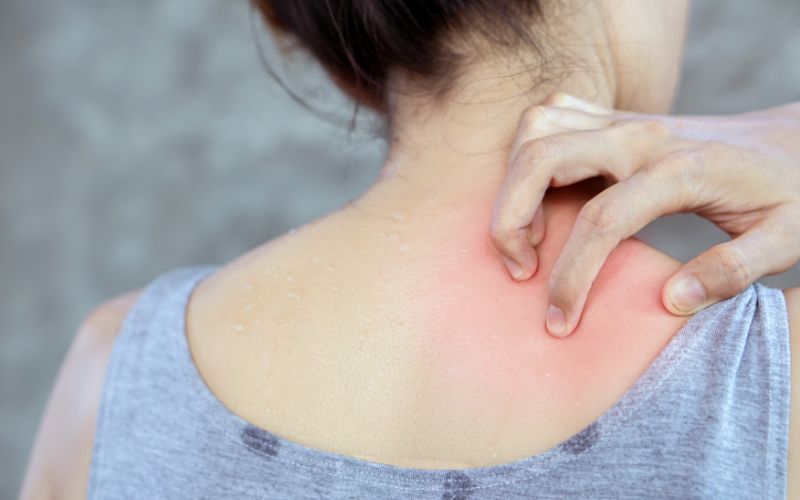Natural Ways To Defeat Skin Allergies And Rashes

Sudden redness, swollen rashes, and painful bumps may irritate you more. Usually, they are capable of making your day stressful because they refrain from wearing makeup and your favorite dresses on some occasions.
Are medicines the only way to treat these allergies? No! You can easily treat it with simple homemade remedies.
Understanding the severity of your allergies is essential to treat them better. For that, here we have gathered some basic types and causes of skin allergies. You can also check our natural remedies to treat them effectively.
Table Of Contents
What Are Skin Allergies?
Sometimes, your skin becomes irritated because the immune system overreacts to something usually harmless. It may cause itching, rash, redness, burning, bumps, hives, and swelling on your skin. These rashes may be painful and bleed whenever you hurt them with your finger.
Following are a few usual suspects of skin allergy.
- Particular Foods: Our immune system identifies specific particles and spices in foods as invaders and produces antibodies to fight against them.
- Antibiotic Creams: Some chemicals present in prescribed creams or over-the-counter options can be the primary reason for your skin allergies.
- Latex: The natural rubber in products like condoms, balloons, disposable gloves, and baby bottles trigger skin allergies.
- Plant-Based Oil: Oils from plants like poison ivy, oak, or sumac cause allergic reactions.
- Nickel: Metals used in belt buckles, jewelry, zippers, and bra hooks may cause contact dermatitis.
- Fragrances: Chemicals added to perfumes, lotions, and other products for smell are some other triggers.
- Ingredients In Household Products: Your skin may react to common preservatives and metals in dishwashers, detergents, cleaners, sunscreens, cosmetics, hair dye, and antiperspirants.
Types Of Skin Allergies
Following are the types of skin allergies.
- Atopic Dermatitis
Atopic dermatitis or eczema is a condition in which your skin becomes easily irritated, itchy, and dry. This allergic condition is more common in children than adults. Genetics (inherited from parents), life habits, skincare mistakes, and environmental factors are linked with eczema.
Foods, stress, soaps, lotions, or cold and dry air may worsen your eczema condition.
- Allergic Contact Dermatitis
Allergic contact dermatitis is the reaction of your body when it comes in contact with an allergic material. Let’s consider a person is allergic to the metal nickel; there, his skin reacts if any jewelry made of nickel touches his skin.
- Urticaria
Urticaria or hives appear on your skin due to the release of histamine into your bloodstream. Sometimes, hives may appear on your skin as a reaction to some allergic food. Temperature, coldness, pressure, and medication conditions like thyroid and infections may create hives in your skin.
- Angioedema
The characteristic of angioedema is swelling in the deep skin layer. It often happens on places like the lips, eyelids, and throat and appears together with hives.
- Hereditary Angioedema (HAE)
Hereditary angioedema (HAE) is a genetic condition that causes severe swelling under your skin outer layer. Some affected areas are feet, hands, face, intestinal wall, and airways. If this is the case, it is essential to consult your doctor for better treatment.
List Of Home Remedies To Treat Skin Allergies
The best method to prevent or treat allergies is avoiding the root causes. Other than that, there are two options. One is using topical creams; the next is trying natural remedies.
You can use a steroid ointment (hydrocortisone) or calamine solution as a topical solution for your allergies. If the natural way is your choice, here are some home remedies.
- Beetroots
Beetroot, a superfood with high nutritional value, works as an antihistamine to treat your allergies.
How To Use: To use beetroot for skin allergy treatment, rub a slice of beetroot over the affected area or gently apply some beetroot juice over the area using a cotton swab.
You can also prepare facial masks by combining beetroot and raw milk to treat your allergies.
- Apple Cider Vinegar
The acetic acid in this ingredient exhibits antimicrobial and anti-inflammatory properties. It is an excellent choice to calm irritated skin. Even though this ingredient is more effective, it isn’t a better choice for people with sensitive skin.
How To Use: In a cup of warm water, add one tablespoon of ACV and mix. Using cotton, apply this mixture to the affected area. Let it dry and then wash it using running water. Do this one twice a day until you get relief.
- Petroleum Jelly
The antibacterial, antifungal, and anti-inflammatory characters of petroleum jelly help in preventing the infection’s spread.
How To Use: Apply petroleum jelly directly to the affected area and leave it for some time. Reapply it in frequent intervals for better results.
- Holy Basil Leaves (Tulsi)
Tulsi, with antifungal, antimicrobial, and anti-inflammatory properties, is a potent Ayurvedic herb that helps treat your different skin issues.
How To Use: Pick fresh tulsi leaves, wash them, and grind them into a smooth paste. Apply this paste to the affected area, and wash it after 30-40 minutes.
- Mint Leaves
Mint with antibacterial properties works best on skin allergies. Also, the antioxidants present in mint leaves give your skin a natural glow.
How To Use: The best way to use mint leaves for skin allergies is to crush them and make a paste. Apply this to your skin allergy and leave it for 30 minutes. Then wash it off.
- Ice Cubes
Ice packs can give quick relief from irritation and inflammation caused by skin allergies. Even a cool, wet cloth can give you relief.
How To Do: Place an ice pack or a damp cloth on the affected area for 10 minutes. It calms your irritated skin. Repeating the same methods many times can give you quick relief.
- Coconut
Coconut extract or oil can be a perfect, easily available home treatment for your skin allergies. The antiseptic and anti-inflammatory properties help you defeat various irritations.
How To Use: Simply apply coconut oil to the affected area and leave it for some time. You can get immediate results with regular use.
Note: If you aren’t allergic to coconut or have acne issues, try to avoid this ingredient.
- Tea Tree Oil
This natural oil has both antiseptic and anti-inflammatory properties to treat your skin allergies.
How To Use: First, dilute this oil with any one of the carrier oils, like coconut oil or olive oil. Then, apply it to your affected area to get better results.
- Aloe Vera Gel
Aloe vera, with rich anti-inflammatory and antifungal properties, is one of the most effective home treatments for all skin allergies.
How To Use: Take extracted aloe vera gel; apply the gel to the affected area; leave it on for 10-25 minutes; rinse or wipe it off. Do this at least 3-4 times daily for faster results.
- Baking Soda
Baking soda is a great treatment for skin itchiness, rashes, and inflammations. It helps in restoring the skin’s natural pH balance.
How To Use: Mix baking soda and distilled water or coconut oil to prepare a paste. Apply this paste to the area and wait for 10 minutes. After that, wash it.
Calm Your Allergies
Generally, skin allergies, rashes, swelling, and hives are caused by an inflammatory reaction to foreign particles. So, to treat them right, you have to identify the cause first. Also, you cannot expect quick results through natural remedies. It takes some time to disappear.
FAQs
Q: Is tomato good for skin allergies?
A: Yes. Tomato, with anti-inflammatory properties, helps treat various skin allergies and soothe irritated skin. Before applying tomato extract to your skin, just do a patch test to ensure you are not allergic to tomatoes.
Q: Does a hot water shower make your allergies better?
A: No, a hot water shower cannot help your skin allergies. Actually, it strips away the natural moisture and oil from your skin and worsens your allergies.
References
- Skin Allergies and Contact Dermatitis: The Basics: https://www.webmd.com/allergies/skin-allergies
- Simple Home Remedies For Skin Allergies and Rashes: https://pharmeasy.in/blog/home-remedies-for-skin-allergies-rashes/
- An Overview of Skin Allergies: https://www.verywellhealth.com/skin-allergies-4013947
- Home Remedies for Skin Allergies: https://www.health-total.com/skin-disorder/home-remedies-for-skin-allergies/
- Effective Home Remedies For Skin Allergies: https://www.floweraura.com/blog/home-remedies-for-skin-allergies
- Do You Have Skin Allergies? These Home Remedies Can Come To Your Rescue: https://www.onlymyhealth.com/natural-home-remedies-for-skin-allergies-1608626726





